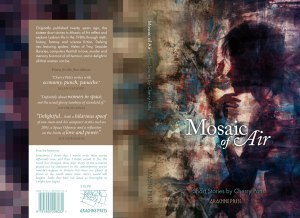Cherry Potts's Blog, page 28
April 11, 2013
Listening between the notes
Monday Night, Croydon Folk Club, Coope Boyes & Simpson gig.
I know I spend a lot of time writing about music, but there is method in it. In the right circumstances, and these were they, being in the front row, singing along with professional musicians who encourage joining in, not only do the spirits lift, but the brain uncreases and all sorts of weird and wonderful ideas get flowing, despite the slightly wistful I wish I could do that that takes over when I hear someone at the top of their game as CB&S are.
Coope Boyes & Simpson are very relaxed, unassuming performers, they chat quite happily between songs, but when they are singing they pay close attention to each other, giving the impression that they might just be improvising, not that I think they are, and there is a feeling that you are eavesdropping on a private session. They feel no need to drag the audience in, there is no need to do more than sing. The timing is exquisite (The Cool of the Day), the harmonies clever and the contained way in which they deliver quite devastating songs (Hill of Little Shoes) is perfect.
To get singing (and song writing – Falling Slowly and Turn Your Face to the Light) of this calibre in a prefab shack at the back of Ruskin House is extraordinary. Worth missing the last train for. Lester Simpson claims to not know anything about music theory, describing one of the songs as not being in 4/4 time, but the changes in tempo in his songs are one of their highlights.
So what does this have to do with writing?
Live music works on two different levels for me, I get completely engrossed in the music, (which is so totally three-dimensional compared to recordings) at the same time that I am following and playing with the harmonies, which have their own spacial existence, I also listen to the spaces between the notes.
I was once asked to explain harmony to a Deaf choreographer, eventually I said, when you have more than one person dancing, what they do reflects and follows and contradicts what the other dancers are doing, and they create shapes that only exist in the relationship between each dancer? (Poor interpreter, that stretched him), Yes yes, she said. Right, that’s what harmony is, just in sound, I said, sweating a little with the effort. She beamed, completely understanding.
So I do, on some level, experience sound (in particular music) as being shape and space and three dimensions, (I’m sure in terms of the physics of sound waves that this is true, if not quite how a scientist would describe it) and that creates room for something else.
Inspiration.


April 7, 2013
Playing at Spring
We know it isn’t really spring, right? A day lent, as A.’s Ma would have said; but it is doing a fair impression: washing drying on the line, bees in the Pulmonaria, first lunch in the garden (in jumper, but still!), but we are promised the bitter east wind back again, and rain too, so i ought to be out there really, making the most of it – I am being drawn away from the computer to inventory all the plants that have died in the snow and wet. It looks like we’ve lost a particularly lovely Cranesbill.
 So multi-tasking as ever, I’m listening to a book on the Black Death by John Hatcher, thinking about the garden, updating Arachne’s website fixing links that have changed, and planning out a story that might make it to Liars’ League for their Kings & Queens theme.
So multi-tasking as ever, I’m listening to a book on the Black Death by John Hatcher, thinking about the garden, updating Arachne’s website fixing links that have changed, and planning out a story that might make it to Liars’ League for their Kings & Queens theme.
The problem with running a publishing enterprise is that I have no more time for writing than I ever did when I was employed. My brain is at least in the right groove, so there are plans afoot for when I do have enough time: turning Mirror into a play, putting together the next collection, fine tuning The Dowry Blade in the light of feedback from fellow author Jack Murphy, and I’ve found my material for the opera I’ve been promising myself for two years. Oh and keeping this blog up to date!


March 20, 2013
Water Aid Day singing
Vocal Chords are singing in St Pancras Station, London, opposite the National Ticket Office at 6pm this Friday, 22nd March. We are raising money for Water Aid by singing our favourite Sing For Water songs.
If you are on your way home from work, get a later train and stay and enjoy, and give generously!


February 24, 2013
Celebrating Benjamin Britten
 So, it’s still LGBT History month, and it’s also Benjamin Britten’s centenary so what better way to celebrate the magnificence of BB’s unapologetic gayness and talent than to sing in Noye’s Fludd?
So, it’s still LGBT History month, and it’s also Benjamin Britten’s centenary so what better way to celebrate the magnificence of BB’s unapologetic gayness and talent than to sing in Noye’s Fludd?
A. has had an ambition to sing some Britten for many the long year so we were thrilled when we heard that our regular singing venue, Blackheath Halls were doing Noye’s Fludd Directed by James Hurley.
There isn’t a vast amount of singing for the adult chorus to do (although there is plenty of ark building!), as the majority of the choral work and six of the principals are taken by children. Apart from the three hymns (Lord Jesus Think on Me, For Those in Peril on the Sea and the Tallis canon) we have only a few Kirie’s and hallelujahs and a short piece as the animals disembark as the flood recedes. However our brief moment is thrilling: all the children and sopranos are singing hallelujahs, and us tenors sing the bottom line of the principals’ verse, which cuts through all the pretty stuff gloriously.
Our orchestra sound superb, with each section in turn – trumpets, recorders, strings, piano/organ, hand bells and in particular percussion getting an opportunity to shine, which they do. I’m getting a huge amount of pleasure from just listening to them nail the rhythms and comedy moments, and the moving discords of the flood: Mrs Noye’s delivery of the slap round the chops to her husband, the dove crooning encouragingly, the tea-cup first drips of rain. Nick Jenkins has every reason to be proud of them, and I think Mr Britten would be pleased with them too. The fact that some of the orchestra are smaller than their instruments makes no difference, they aren’t good-for-their-age, these are talented musicians and performers: I look forward to being able to say ‘I worked with her/him when …’ when they are famous.
The design (by Rachel Szmukler) is huge fun with the animal masks for the children a delight of recycled plastic bottles and spoons. A special mention for the giraffes, who act their ears and horns off, disapproving of Mrs Noye, anxious of the waves, consoling Mr Noye and fascinated by the other animals. the fact that their ears flap with such dignity is a massive assistance.
Atmospheric lighting from Ben Pickersgill makes our flood refugees; shelter effectively dreary and murky, and the children have produced some really stylish pictures for our wall of ‘missing’ family and pets, and images of animals floods and arks. The piles of dead TVs, sleeping bags and suitcases create a suitably chaotic impression, and teething problems with the overly ambitious building of the seating for the audience are now resolved.
We are privileged to be working with Matthew Rose and Clarissa Meek (Mr & Mrs Noye) who aren’t a bit worried about getting physical as they climb about arks and giant water tanks.
A special mention for Mrs Noye’s ‘gossips’, who wield their umbrellas with wit and panache and sing beautifully, and Lawrence Wallington as Voice of God, by turns sinister and kindly, directing his angelic property men to bring up the flood of sleeping bags, or deliver the dove back to Noye’s waiting hands.
Sorry to get you all enthusiastic, because unfortunately the shows are all sold out!


February 11, 2013
LGBT History Month
February is LGBT History Month, and I’ve had it drawn to my attention how few new UK Lesbian voices are getting published, which sent me off to peruse my shelves. Now, I think of myself as having a fairly comprehensive collection, but actually there isn’t a vast swathe of stuff there, and most of it I’ve had a while. So here’s an unscientific survey of what’s on the shelf – inclusion doesn’t mean that the author is a Lesbian (sadly) but that they have written about lesbians with conviction, or in some honourable cases so badly as to make me weep with laughter. Having had a sift through I realise I’ve got rid of a lot of the books I bought in the 80′s, when I was devouring books at a rate of 3 a day. Some of them gave me hiccups, these are the ones that survived the cull.
Oldies but goldies (Mostly from the 20′s or earlier)
Radcliffe Hall: The Well of Loneliness, a book that probably caused more women to think they couldn’t possibly be lesbians than any other. (UK)
Rosamund Lehmann: Dusty Answer – I don’t think Lehmann can have been a lesbian herself, but she gave a lot of people a good laugh with this book. oh dear, oh dear. (UK)
Colette: The Claudine books, esp Claudine & Annie (France)
Miles Franklin: My Beautiful Career (Australia)
Nella Larsen: Passing – I read this without realising it was about a Lesbian affair. Only when I read the preface (never read the preface before the book!) did I cotton on. Very discreet! (USA)
Mary Renault: The Friendly Young Ladies. There’s an argument for Mary Renault’s entire oeuvre being designated as Lesbian books, all her male gay characters are like lesbians in disguise. (UK)
Josephine Tey: Miss Pym Disposes mystery with Lesbian sub plot. Very sad.(UK)
60′s 70′s 80′s
Rita Mae Brown: Ruby Fruit Jungle another classic of its time, but really annoying. (USA)
Rosemary Manning: The Chinese Garden (UK)
Jane Rule: Lots of books. (USA)
Penelope Lively: Nothing Missing but the Samovar – a short story collection included here for one story, one of the best, most matter of fact depictions of elderly lesbians I’ve ever read.
Anna Livia: Relatively Norma (UK)
Maureen Duffy: The Microcosm (unreadable) and That’s How It Was (Brilliant) (UK)
Caroline Natzler Water Wings. (UK)
Nicky Edwards: Stealing Time (UK)
Mary Dorcey: Noises from the Woodshed (UK)
Isabel Miller: Patience & Sarah (A book I didn’t realise was funny the first time I read it, so starved of Lesbian texts was I) (USA)
Patricia Duncker: James Miranda Barry A magnificent book(UK)
Ellen Galford: Moll Cutpurse, Fires of Bride, The Dyke & the Dybuk (UK)
Katherine V Forrest: lots of detective fiction (USA)
Nicola Griffith: Ammonite, Stay, several others (USA)
Stevie Davies: Impassioned Clay (and others but this one especially) (UK)
Elizabeth A Lynn: The Northern Girl (and others but this one especially) (USA)
More recent:
Emma Donoghue: Hood, Stir Fry, Kissing the Witch (UK)
Helen Humphreys: Leaving Earth (US)
Ursula Le Guin: The Sea Road (Included for a single story, but Ursula’s been playing games with gender for ever, everyone should read The Left Hand of Darkness it turns your brain inside out.) (USA)
Marion Foster: The Monarchs are Flying (US)
Tracey Chevalier: Falling Angels, Remarkable Creatures (UK)
VG Lee: Diary of a Provincial Lesbian, As You Step Outside (UK)
Manda Scott: Hens Teeth, The Boudicca series (UK)
Sarah Waters: of course. (UK)
Poetry
U A Fanthorpe (UK)
Jackie Kay (UK)
Kate Foley (UK)
Carol Ann Duffy (UK)
Marilyn Hacker (USA)
Adrienne Rich (USA)
And loads of anthologies of both fiction and poetry, which probably deserve a good root through and a post of their own.
I realise now that learning to drive slowed up my consumption of books considerably, as did the job-from-hell. I go on about how I didn’t write for eleven years, but actually I didn’t read much then either. What kind of a life is that? Shocking. Something to consider: If you don’t have time to read, how are you feeding your brain?
Happy LGBT History Month! Go read a good, lesbian, book – quickly.


February 7, 2013
Writing from a Lesbian Perspective
Its LGBT History Month. Whether you know this may depend on whether you or any of your friends is Lesbian, Gay, Bisexual or Transgender. It certainly doesn’t get the kind of coverage Black History month gets. With my Arachne Press hat on, I’m doing a reading tonight at Ealing and on Monday at Deptford, with others, and will be reading one of the first stories I ever wrote - Leaving, which is about leaving a job, not a lover, in case you are wondering. I wrote it around 1986 so it’s practically an historical document itself.
There has been some concern voiced by the Judges of the Polari prize about the dearth of new UK Lesbian writers. I do wonder – is it that lesbians are no longer identifying themselves? No longer writing about Lesbian experience? And do we have to write about lesbian experience to bring that experience to bear? I don’t think so – I remember a long conversation with Rosemary Manning (a dear friend and a magnificent Lesbian) about how one of her (straight, male) characters were written as if he were a lesbian, not from the perspective of sexuality, but from the perspective of outsider-ness.
An aside, will being able to get married – if it gets all the way through the legislative process – intrinsically change that outsider status? Time will tell, and frankly there are still places it’s illegal and/ or dangerous to be a Lesbian, so unless we all sit smugly feeling we’re all right where we are, – I bet Weimar Republic Lesbians thought that, briefly – it’s kind of hard to shake.
I use this perspective when I rewrite myths. I’ve never been a fan of Freud’s use of myth to explain his own neuroses but he did keep the (Greek) myths in the forefront of the western mind.
If we lose the assumption that love between the hero and heroine is automatic, inevitable, ordained, there is room to take a look at what other motivation there is for their (re)actions.
So for example, if Helen does not love her husband (a dynastic match, so why should she?), and if she doesn’t love Paris (and how could she?) we can remember that Homeric women are parcelled out like a loaf of bread (or an apple) between hungry feasters, and ask:
What did she think, who, if anyone, did she love? What might it be like to be the catalyst of a ten-year war and the destruction of a dynasty? And why didn’t Priam chuck her off the walls of Troy at first sight of the black ships?
Once you remove the most basic presumption of sexuality and stop being snared and beguiled by the obvious story of girl meets boy etc, etc, you are free to turn your head away from the glitzy main text and explore the why behind many other ‘obvious’ becauses and champion the minor character, the underdog, or perhaps the slave in the corner: seeing, thinking, feeling, but unseen.


January 3, 2013
On the Side of the Angels 1
An occassional dip into the early medieval paintings in the National Gallery, London, prompted by a four-hour longeur at a conference and proximity to beauty – and my inability to resist putting words into the mouths of painted faces, and motives into painted attitudes.
Wilton Diptych 1390’s anonymous. King Richard II kneels on the left, gazing towards the Virgin, his hands raised but slightly apart as though waiting to catch something.
King Richard II kneels on the left, gazing towards the Virgin, his hands raised but slightly apart as though waiting to catch something.
On the right, Heaven looks crowded, the sky golden and figured, more like a great gate than the firmament, pressing up against the regiments of cobalt clad angels.
The back row are there under protest, even though they all wear the white hart brooch as Richard does. Their arms are crossed or interlinked, as they tug at each other.
Come away, they say, he’s not dead yet, and he’s not at all good, so why would we be interested in his prayers?
The kneeling, rose-bedecked angel, who perhaps should be interceding with the virgin, raises a hand indicating lost causes, it will shrug in a moment.
rose-bedecked angel, who perhaps should be interceding with the virgin, raises a hand indicating lost causes, it will shrug in a moment.
Lady, it says, there’s nothing here for you.
On the far side of the virgin, an angel points derisively, and its companion sniggers.
You aren’t going to listen to him are you?
It seems that despite the heavenly chorus, the virgin will listen.
To Richard’s benefit, he has on his team Edward the confessor and St Edmund, both English kings, like himself, and both venerated as saints – and the Baptist.
Is Richard implying that all it takes is for the Baptist (his patron saint) to give the word, and this callow youth will also be sainted? There is something of hubris here.
The only angel notionally fighting Richard’s corner carries a St George pennant, but can only bring itself to point him out to the Christ child with a furtive finger, embarrassed at the scorn of its fellows. The child stands out against the heavenly blue in his golden blanket, his feet press against his mother upper arm and hand, and leaning vigorous and gurgling towards Richard, he crooks a welcoming hand.
The child stands out against the heavenly blue in his golden blanket, his feet press against his mother upper arm and hand, and leaning vigorous and gurgling towards Richard, he crooks a welcoming hand.
Come on in, he says, you get used to the laughter, and it’s a great deal better than weeping – your choice, obviously.
The angels sneer discreetly and waft off, no doubt to ensure good seats at the latest harp concert.
Go and see the real thing at the National Gallery, make up your own story…
© Cherry Potts 2013


December 28, 2012
Chestnuts roasting on an open fire
I love chestnuts, we eat them regularly, in stews, nut roasts, cakes… especially since discovering the vacuum packed french version. I heard something on the radio last week about a man who only liked them in Mont blanc pudding (mostly meringue and cream). (there was also an idiot on Breakfast TV telling the viewing public how to cook sprouts completely wrong, but that is an associated but trivial detail!) I was about to make Chestnut Yule Log (Delia Smith recipe – chocolate flourless sponge, cream and chestnut puree – magnificent… by the way buy the French unsweetened puree for this and sweeten it yourself, the sweet one is horrid and the standard British unsweetened puree available in supermarkets is watered to within an inch of its life and tastes of NOTHING), and I thought, no, maybe something different this year.
I don’t love christmas cake, or christmas pudding. I will eat them, and for years I alternated making them because both in one year is too much: My Christmas cake was another Delia Smith recipe (actually a wedding cake, but who cares) into which I put dried apricots instead of raisins and dried banana instead of sultanas. Delia is a goddess, her recipes are reliable (my copy of her Book of Cakes is in 4 pieces and covered in spillages but nursed carefully whenever it is needed) but she doesn’t understand about dried fruit. Sultanas and Raisins are BORING.
I tend to make a cake for 12th night these days, as yule log is a pudding not a cake, but does excellently for both, and quite enough to last us to new year when we have a breather. I have, without Delia’s assistance, experimented with making Panettone (unreliable, perfect one year a travesty the next) and Stollen (works every time), both with apricots and ginger in them. A claims not to like marzipan, but eats my Stollen very happily.
A digression: in the spirit of pick something up from the TV or radio and do something else with it, I also made savoury Chelsea buns this year, à la Paul Hollywood. The first lot was cranberry sauce, feta cheese and walnuts and were too dry. The second lot was walnut pesto, smoked tomato and artichoke heart and were fabulous.
I love ginger. Ale, beer,wine, pickled, stem, crystallised, dried, ginger bread, ginger cake, ginger ice cream.
Can you see where this is going yet?
Like the man on the radio I love a good meringue. and I’m fond of Eton Mess.
So let me introduce you to my latest Christmas innovation, Winter Mess.
you will need
Meringues (home-made if you’ve got the patience, but its a waste of a good meringue, use shop bought instead) – as many as you are happy with.
Marscapone (I don’t know whether it’s better for you than cream, but it’s thicker and more fun, so its unlikely) a standard pot as sold in the shop.
Stem ginger - a couple of lumps and a generous spoonful of the syrup.
Optional: a spoonful of brandy, this tends to take the body out of your marscapone so only use it if you are going to eat immediately or a pudding isn’t a pudding for you without alcohol in it.
Candied Chestnuts about 10 and as much syrup as covers them in the jar (ours came from the Turkish Deli on borough market, two years ago – they kept perfectly – they don’t have them on their website so this may be the only year we ever have this!) Marrons Glacés aren’t the same – too gooey – but would do at a pinch, or get a tin of chestnuts and candy them yourself, it has to be worth the effort. If you do that, you want to produce lots of syrup, not crystallising.
Whip the marscapone lightly, stir in the syrups from the ginger and the chestnuts (and the brandy if using it), chop the ginger and chestnuts roughly and stir in, then bash up your meringue into pieces about an inch square any smaller and it will dissolve (this is why it’s not worth making them) and stir that in too. put in the fridge for at least half an hour … then eat in front of the TV.
Very rich, so would probably serve 4 people, unless you are greedy in which case three tops.
If you insist on a cake, this year we had banana and pecan cake (another Delia recipe with Pecans instead of walnuts) rather nice with a spoonful of mess on it.
Hmm there’s something about recipes that makes me come over all dictatorial!
© Cherry Potts 2012


December 26, 2012
Festive Spirits
Christmas is all about singing for me, either performing, or in the audience. This year was no exception, starting with a superb workshop of traditional folk carols with Lester Simpson on the 1st December. We learnt Adam Lay ybounden (15th Century), Dunstan Lullaby (very simple, very effective) and a couple of variants of While Shepherds watched, one of which, Shepherds Rejoice was absolutely glorious. Lester is a fearless teacher – here is this group of thirty people most of whom have not sung together before, and he has us in four parts (despite only having 2 basses), with echoes and offset rhythms, and we just rose to the challenge. We hope to make these workshops an annual event (Christmas wise) and perhaps fit in one or two more during the year. If you are interested in attending contact me and I will make sure you are told when the next one is.
Shepherds Rejoice sung at Lester Simpson’s Workshop
The following day we were in the audience for the Trade Winds concert at St Johns in Catford, which we made by the skin of teeth, going straight there from the launch of Stations at the Brunel Museum. We knew many of the songs and joined in happily.
Then there was the Raise the Roof Christmas Concert at the Horniman. The final one under the direction of Melanie Harrold, which made it rather emotional. We sang a lot of the same songs as Trade Winds, but RtR has always made a raucous, joyous, racket, so the style was a little different even though the same arrangements.
During the rehearsal I started feeling really tired and had to sit on the floor; and by Monday (rehearsal for Vivaldi Gloria at Blackheath Halls) was feeling decidedly below par.
Wednesday rehearsing for carol singing with Summer All Year Long, couldn’t hold a tune or remember a part.
Thursday, dress rehearsal for Gloria, too ill to go.
Friday, performance, got through the Gloria (and it was rather fine) and went home in the interval to nurse my temperature. Not a happy bunny, week-long singing all thrown into a mess by a cold.
Saturday, Carol singing with SAYL at Hills & Parkes – Me A, M and P all with colds or worse, T with a broken rib, not our finest hour, minute audience. Further carol singing at Brockley Christmas Market (in the rain), ditto, though joined by L, and S turned up to help shake the collecting tin. I don’t think Shelter did very well out of our efforts this year.
So, I had really got to the point where I didn’t think festive spirit was going to stir at all, and we had tickets for Michael Morpurgo’s On Angel’s Wings, in Salisbury Cathedral for the Saturday that all the trains were up the creek due to flooding. The reason for this overland trek was that the story was being interpreted by Michael himself, with Juliet Stevenson, and Coope Boyes & Simpson (joined by Fi Fraser, Jo Freya and Georgina Boyes) singing carols including the ones we had learnt with Lester, and we really wanted to hear him sing them as they should be sung..
If we get to Waterloo and its even a bit dodgy we are coming straight home we promised each other, coughing fitfully.
And the train was half empty and left on time.
And the Cathedral had an actual donkey and sheep tucked away in the cloisters, to keep the queue amused.
And we got reasonable seats.
And (once they got all the microphones working) it was lovely – a charming story beautifully told, first class music and one of the best buildings in the country. Festive spirit woke up with a bang.
Quentin Blake’s beautiful illustrations were projected onto a huge screen, there were (rather sinister) angels suspended from the columns, and CB&S and friends sang magnificently. In particular Shepherds Rejoice, the song Lester had taught us, there was a moment (goodwill to men, and peace and endless love… it didn’t happen like that when we sang it – one day we will be able to match the accoustic glory) when so much was going on it didn’t seem possible it was only six voices, it was worth the journey just for that fleeting, golden moment.


getting a cover for a book
This is a strange way of going about things, but I’ve just chosen a cover for a book that I haven’t finished writing yet.
We’ve been running a competition over at Arachne Press for the covers of the next two books, and I got down to three gorgeous, wonderful designs for the reprint of Mosaic of Air, and couldn’t choose between them. I wanted them all! So I had a bit of a think about other books we have planned, and decided that only one of the designs would only work for a collection of stories, and have chosen that one for Mosaic of Air. So I get to use the other two designs. for my two novels. Anyway the one that I’ve not finished writing yet is this, from Kevin Threlfall – you’ll have to imagine a different title for now.

copyright Kevin Threlfall
The book is a sci-fi novel and doesn’t have a title yet, though it’s going by The Dark Is My Delight, which is a 17th century song about nightingales and sex, basically (words by John Marston, music anonymous); nothing to do with my storyline as it happens, but it has the right feel to it, out of context. The book started life as the lead story in Mosaic of Air, and has grown and morphed into something much larger and more complex. As Mosaic of (the) Air is a quotation from an Andrew Marvell poem (describing music) it seems right to continue the theme of music and the 17th century by picking another title from the same era. (I had thought about Heavy Time, which is also a 17th century musical quotation, but it’s already been used for an excellent Sci-fi novel by CJ Cherryh – who also nicked my intended pseudonym when I was about 17, at which point I decided to write under my own name and have done with it.)
So, interesting how that all galvanises me to finish the book!
© Cherry Potts 2012





